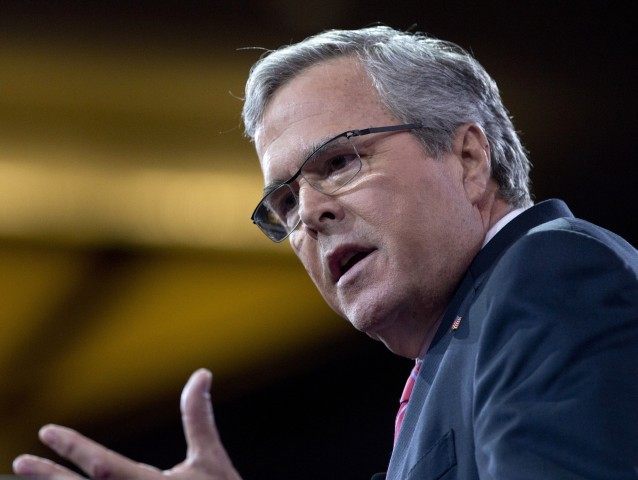Jeb Bush may be finding the Common Core issue a little harder to shake than he anticipated. From the beginning of the campaign for these national curriculum standards, Bush has been the most prominent and outspoken Republican supporter.
But outside the echo chamber of the elitist “reform” circles in which he usually moves, Bush is now having to bob and weave to duck the issue. So far, he has failed.
When the parents’ movement first began, Bush’s instinctive response to Common Core critics was to dismiss them as hysterical know-nothings. What could these people, who after all aren’t “experts,” have to contribute to a discussion of their children’s education? Such parents were simply afraid of raising the bar in the schools. “If you’re comfortable with mediocrity, fine,” he sniffed. “I’m not.”
Or he has dismissed such parents as wingnuts: “Criticisms and conspiracy theories are easy attention grabbers,” he has argued. And, moreover, opponents lack “solutions.”
But now that he’s (probably) running for his party’s presidential nomination, he has to answer to the people. And the people are not happy. Bush’s current approach to the issue is telling.
He avoids the “toxic” term “Common Core.”
And, like many Common Core-supporting Republicans, he accuses President Obama of hi-jacking the standards. For example, when Sean Hannity asked him about Common Core, Bush argued, “With this President and this Department of Education there’s a risk that they will intrude, and they have as it relates to Race to the Top….” He then implied that the present attempt to reauthorize No Child Left Behind would fix that little transgression by prohibiting the federal government from “either directly or indirectly” having a role in the standards and curriculum.
These arguments rest on deception.
Rather than hi-jack the standards, the Administration simply accepted the invitation of the Common Core initiative – those private entities that own and developed the standards—to incentivize state adoption of Common Core through federal grants. As to the prohibitions Bush advocates, they already exist. And the proposed prohibitions, like the existing ones, have no enforcement mechanism and would therefore be ineffective.
Bush’s spin makes him sound empathetic to the growing left-right movement to eject the federal government from decisions on standards, high-stakes testing, teacher evaluations, etc. But he glosses over his own record.
He is a long-time proponent of federal involvement. At NBC’s 2011 Education Summit (financed with a $500,000 grant from the Gates Foundation), Bush endorsed the President’s education agenda: “Look, I think Secretary Duncan and President Obama deserve credit for pushing—for putting pressure on states to change . . . they’re providing carrots and sticks and I think that’s appropriate.”
And when asked about Common Core, Bush falls back on the talking point that he wants “higher standards that develop critical thinking skills.” Presumably, he means Common Core.
But few in the media have asked the obvious questions: Why do you think the Common Core standards are of high quality? Parents across the country have been researching these questions for several years now and have learned that, in fact, the national standards are mediocre at best and they lock children into an inferior education.
The only English content expert on the Common Core Validation Committee has demonstrated repeatedly that the English language arts standards cannot prepare students for authentic college course work. And the committee’s only math content expert has similarly shown that the math standards will leave our students at least two years behind those of high-achieving countries by eighth grade and that they get worse in high school. Likewise, in the judgment of Marina Ratner, one of the world’s most gifted mathematicians and professor emerita of mathematics at the University of California at Berkeley, “[S]tudents taught in the way that these standards require would have little chance of being admitted to even an average college and would certainly struggle if they did get in.”
This information has been as available to Bush as it has been to the parents he so disdains. Why has he not investigated it? Does he really just accept the assurances of his foundation’s generous funders that Common Core is great and will transform American education? Why does he not apply the “critical thinking” he says he encourages to the question of the quality of the Common Core?
If this is an indication of how Bush would approach other issues as President, even the shrinking minority of Republican voters who don’t consider Common Core support a deal-breaker might want to think more critically about a Bush candidacy.
Emmett McGroarty is education director and Jane Robbins is senior fellow for education at the American Principles Project in Washington, D.C.

COMMENTS
Please let us know if you're having issues with commenting.